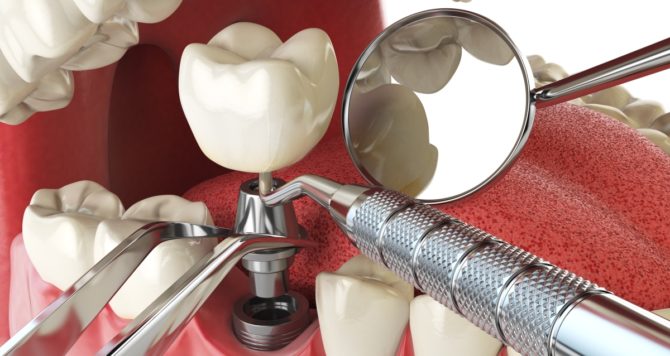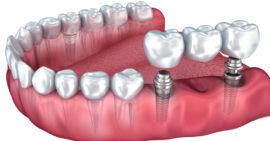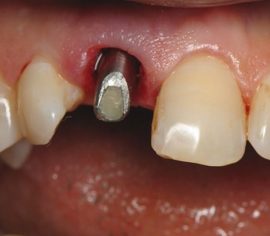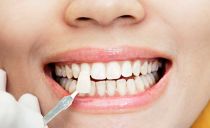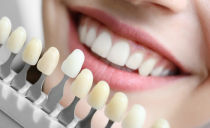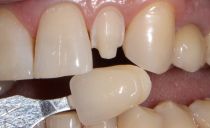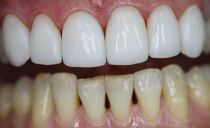Dental implants - contraindications and possible complications
Implantation allows you to fix any defects in the dentition, therefore, patients are increasingly turning to dentists to install implants and microimplants from new high-quality materials. But implantation differs from other methods of prosthetics with a large list of contraindications and possible complications, therefore, before choosing this method of restoration of the dentition, you should familiarize yourself with its inherent features.
Content
Preliminary diagnosis, indications and contraindications
Dental implants are performed for various indications. Implants are used if one or more teeth are missing, in which case they are installed as full dentures or as a support for other designs. In the complete absence of teeth, implantation is carried out as an independent method of prosthetics or as an auxiliary, when only 4-6 implants are implanted in the jaw, and other prostheses are installed on them.
Implantation is a full-fledged operation, which is contraindicated in the presence of certain diseases and disorders, since they increase the risk of unpleasant complications. Therefore, before prosthetics with implants, the dentist examines the patient to assess the state of his oral cavity and general health. For this, the following diagnostic methods are used:
- Examination of teeth and gums for the presence of caries, tartar, inflammatory processes.
- Checking the bite.
- X-ray of the jaw.
- Blood tests for infection, clotting and sugar levels.
If the dentist suspects the presence of any pathologies of the internal organs that may become an obstacle to the procedure, he can send the patient for consultation with specialists of a different profile, for example, a cardiologist, oncologist or immunologist.
Absolute contraindications for the installation of dental implants
Absolute contraindications to implantation are those factors in which the operation is strictly prohibited. These include:
- Diseases of the blood, blood forming organs, violation of the coagulation process.
- Diseases of the nervous system.
- Oncological neoplasms in any organ.
- Connective tissue diseases.
- Immune and autoimmune disorders, the presence of HIV status.
- Tuberculosis.
- Severe diseases of the oral cavity.
- The tendency to bruxism.
- Diabetes.
- Renal failure.
- Congenital bone pathology of the jaw.
- Children and adolescents (up to 18 years).
Prosthetics methods related to implantology are contraindicated in the presence of such an anatomical feature as a small distance from the installation site of the prosthesis to the maxillary or sinus sinus.
Implantation is a serious surgical intervention, which is accompanied by severe pain, therefore, without anesthesia, implants are not placed. If the patient develops an allergic reaction to anesthetics, he will have to look for other ways to solve dental problems. Individual contraindications are also taken into account: Do not put dental implants made of a material that causes allergies in a particular patient.
Relative contraindications to the installation of dental implants
The presence of relative contraindications to the installation of dental implants does not exclude the possibility of prosthetics. The patient can perform this procedure after appropriate treatment, provided that the state of health is normalized. This group of contraindications include:
- Local oral diseases.
- Inflammation of the ENT organs.
- Bite defects.
- Diseases of the mandibular joint.
- Pathology of bone tissue.
- Sexually transmitted infections.
- The rehabilitation period after another operation.
- Rehabilitation after radiation therapy.
- Taking antidepressants.
- Age over 60 years (requires a more thorough examination).
Dental implants during pregnancy can cause harm to the unborn baby, as it is a kind of stress for the mother and is accompanied by the use of various medications. Therefore woman prosthetics should be postponed until the postpartum period, and with breastfeeding - until the end of lactation.
If the patient suffers from alcohol, drug addiction or constantly ignores the observance of hygiene rules, he must abandon his addictions and return to a normal lifestyle. Then, in the absence of other problems, the doctor can install a prosthesis for him. If a person does not seek to change his lifestyle and continues to cause harm to health, these contraindications to the installation of dental implants go into the category of absolute, and the dentist decides on a final refusal to perform the operation.
Deciding on the possibility of implantation
After a full examination, the dentist informs the patient about the absence or presence of contraindications for dental implants. If they belong to the absolute group, the doctor informs about other modern methods of correcting the dentition. The search for alternative methods continues even if the person is not psychologically ready to endure all unpleasant procedures during prosthetics.
If there are contraindications for dental implants, but they are relative, further actions will be as follows:
- If there is an untreated disease, a person undergoes therapy with a doctor of the corresponding specialization.
- If you need to temporarily postpone the intervention, for example, until childbirth, the end of lactation or until adulthood, the patient waits a certain time and during this period carefully looks after the oral cavity.
Different dentists have different attitudes to the same prohibitions on implantation. For example, some dentists prohibit patients under the age of 18 from inserting prostheses, while others advise postponing prosthetics before the age of 22. In some dentists, implantation is carried out even by pregnant women, but only in the second trimester and with good health.
The decision about the possibility of installing an implant is affected not only by the presence of a disease, but also by its severity.
Possible complications
If important contraindications for the installation of dental implants were ignored, the doctor made mistakes during the manipulations, or the person did not follow the rules of nutrition and oral care during the healing period, the following complications may occur:
| Complication | Possible reasons |
|---|---|
| Prolonged and heavy bleeding (longer than 3 days) | Doctor injury or mistake during surgery |
| Severe, prolonged pain | Errors during implantation, the development of infection |
| Soft tissue numbness | Nerve damage |
| Severe soft tissue swelling | Infection development |
| High temperature that lasts longer than 3 days | The development of infection in the jaw around the installed implant or its rejection by the body |
| Violation of the integrity of the seams | Injury or infection in tissues around the implant |
| Reimplantitis - signs of inflammation around the implant | Tissue infection during dental implants or due to non-compliance with hygiene rules |
| Implant Mobility | Features of bone structure or implantation errors |
Healing problems
There are some health problems that interfere with tissue healing after implant placement. For example, if a person is in a state of deep prolonged stress, the body may not be able to cope with the next load, and the healing process of the tissues will be delayed. Regeneration is sometimes complicated by internal diseases and depletion of the body due to malnutrition, severe illness, and complex surgery.
After the implantation, the dentist warns the patient about possible discomfort. Moderate pain, swelling of the gums and a slight increase in temperature in the first two days after the procedure is the norm, not a complication. But it is impossible to ignore alarming symptoms that persist longer than the specified time. Inaction is not only fraught with the possible loss of an implant, but also threatens the patient's life.
Ignoring contraindications for the use of dental implants can be life threatening. If the doctor has decided that implantation is not possible, another prosthesis can be placed. In order not to provoke complications after installation of the implant, it is necessary to strictly observe the rules of behavior during the period of its engraftment.

